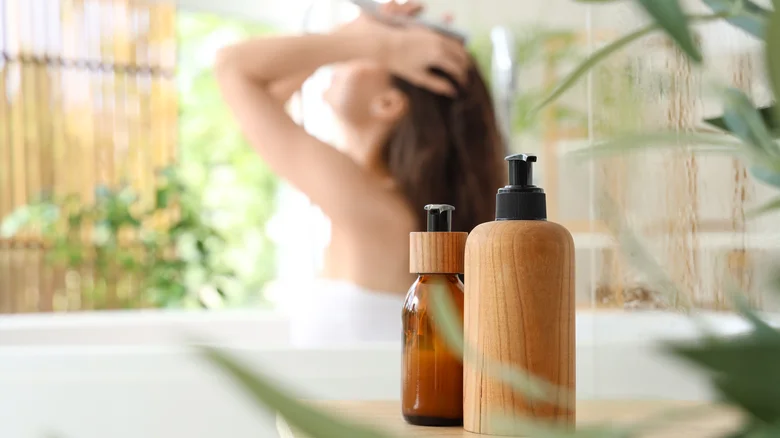What To Know Before You Switch To Fermented Haircare Products
This year has blessed us with a ton of interesting hair trends. Summer saw the widespread popularity of the wet look via hydro hair, while hair care products focused on boosting shine have been taking over the market. Now, we’re applying a concept we know well from the culinary scene to our hair care routines. Welcome to the world of fermented hair care, which is said to offer a variety of benefits. The rise in popularity of fermented hair products may have been sparked by Beyoncé’s Rice Protein and Rose Ritual from her Cécred line, but several other similar shampoos, conditioners, and treatments are also flying off the shelves, including The Rootist’s BioBrew Fermented Leave-In Hair Serum.
As certified trichologist Penny James of the Penny James Trichology Center explains, these hair care products contain fermented plants and oils, with fermented rice water being one of the most common ingredients. “Studies have shown that they aid hair growth; they offer promising anti-inflammatory compounds that are helpful in balancing the scalp microbiome,” she tells Glam exclusively. A 2023 study published in the journal Biomolecules supports this theory, finding that experimental hair products using fermented papaya and fermented mangosteen “significantly inhibited hair loss, increased hair density/thickness, and improved hair follicle structure compared to placebo and caffeine controls.” Additionally, these products were able to balance the scalp microbiota pattern.
Along with potential benefits like hair growth and reduced inflammation, fermented hair care can also lead to improved hair texture and a moisturized scalp. Penny James shares that incorporating these products into your routine is easy, but despite their many benefits, it may not be necessary to go out and replace your products with fermented hair care products just yet.
How to use fermented hair products

Aside from the proposed benefits that fermented hair care products can have on your hair, including the fact that they serve as a foolproof way to stimulate hair growth and pave the way to a healthier scalp, they are also convenient to use. In our exclusive chat, Penny James reveals that they are used in the same way and with the same frequency as regular hair care products, just waiting for the instructions on the packaging. For example, KamiCha’s highly-rated Fermented Rice and Green Tea Hair Oil simply requires you to add between one and four drops to your hair (or a hair mask) and leave it on overnight. You can also apply it before styling your hair. As with any product, pay attention to how your hair responds to the fermented hair care products you use and then adjust your usage accordingly if necessary.
The characteristics of fermented hair care products vary between brands, but one common quality you may notice is that they tend to lather easily. Because many are quite potent, a little goes a long way, too. How much product you should actually use can depend on your hair type and density, but these products generally require less to do more.
Should you make a full switch to fermented haircare products?

Despite the benefits and convenience of fermented hair care products, Penny James believes that the best solution to any hair problem is always personalized and unique to each individual. “With every new product idea that comes out on the market, not everyone will benefit from fermented hair care product lines, and [fermented hair care product] companies are creating a lot of hype about it,” she tells Glam exclusively, adding that every person has a different microbiome, so balancing it should require a case-by-case approach. However, the fact is that failing to balance your scalp microbiome can lead to problems. Instead of immediately switching your current products to fermented ones, she recommends consulting a trichologist to find out what your hair and scalp actually need and going from there.
“Here’s my advice: If you maintain a healthy hair care lifestyle, this alone will help your scalp microbiome,” she says. “There needs to be a lot more research done on fermented hair care products.” That said, James notes that if you want to try fermented products for the potential benefits, the risk isn’t huge, even if the products don’t end up working for you: “There’s no real downside to using a product that’s going to reduce inflammation and suppress itchiness.” The real stakes lie in wasting money on a treatment that may not be right for you, as some fermented products cost upwards of $50 per bottle. You could reduce the risk by starting with a cheaper option that’s still highly rated, like Mimosu’s Hair Growth Shampoo Bar, which is made with fermented rice water and will set you back just $15.98 at the time of this writing.